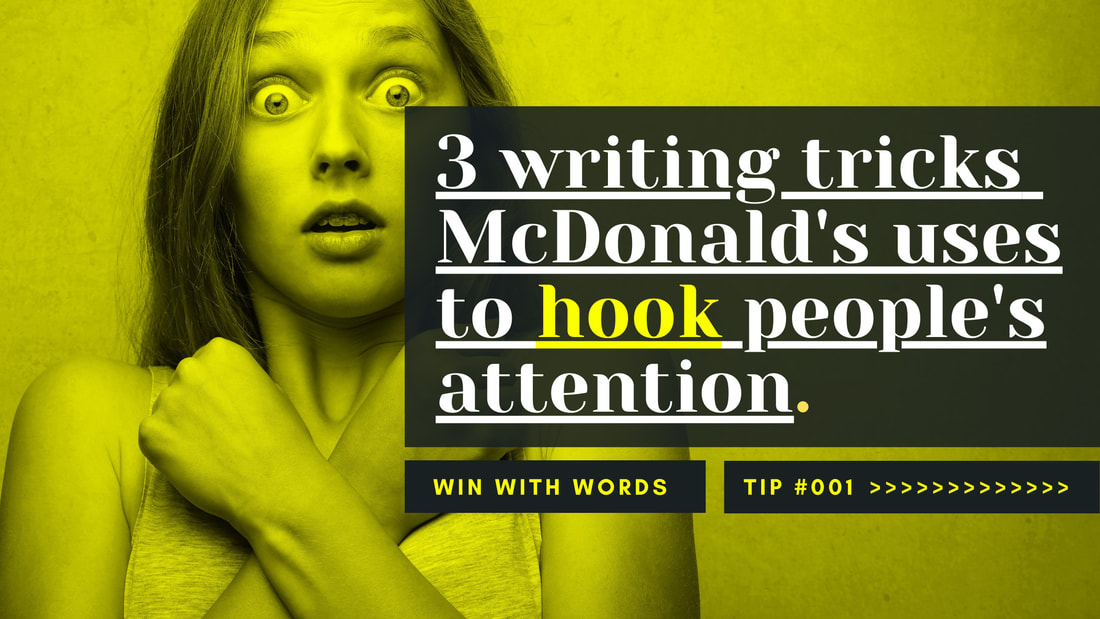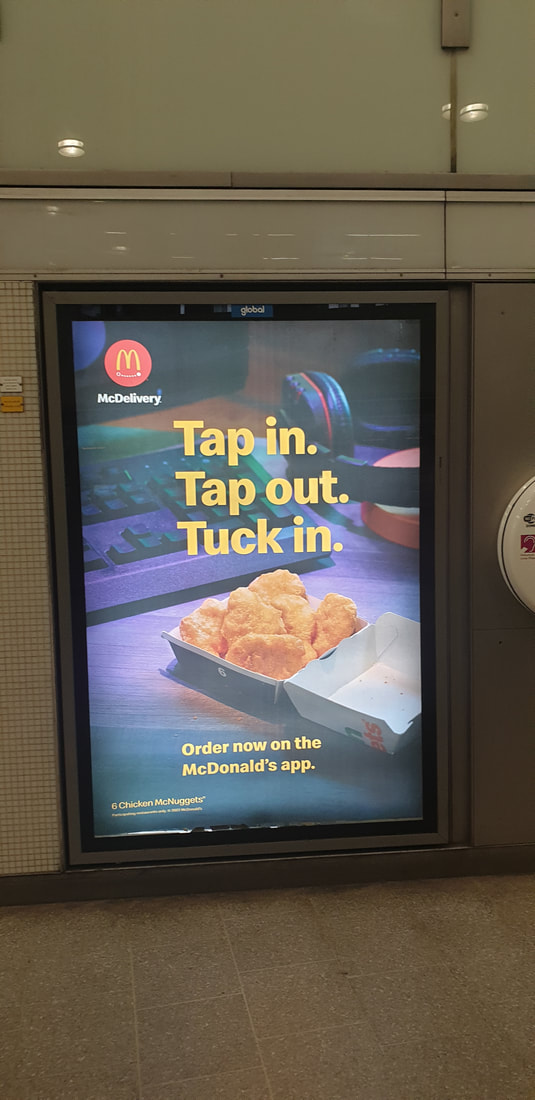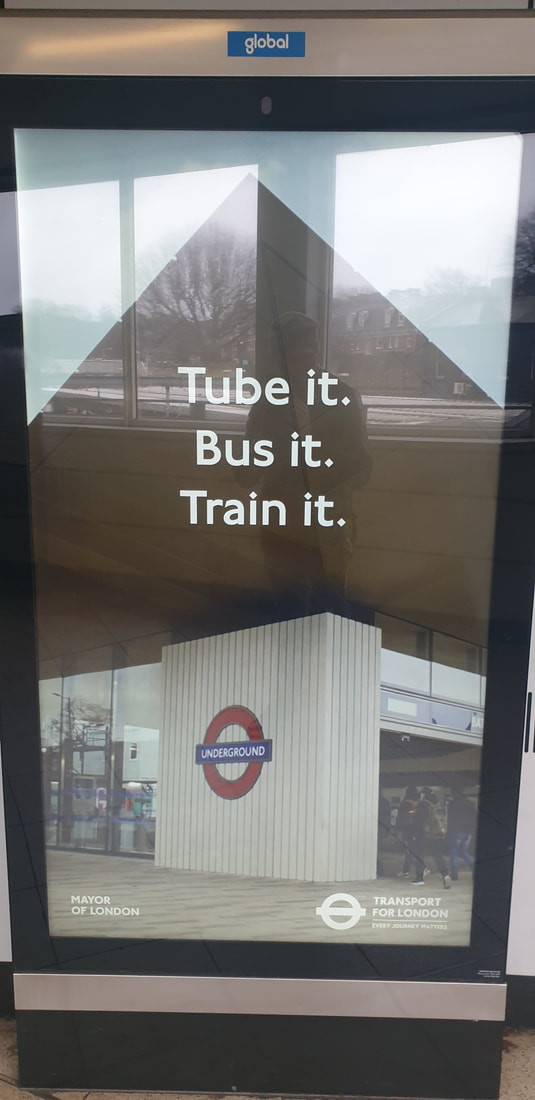|
Never underestimate how stupid I felt standing in London's busiest underground station taking pictures of chicken nuggets bolted to a wall. Genuine shame. Happily, there was also an upside. "Amazing!" I thought, "This is perfect for our next instalment of 'WIN WITH WORDS'. So here's Tip #006 of 'WIN WITH WORDS' - helpful insights that show you how to be more persuasive, strategic and effective with your written comms. Using real examples from the world's biggest brands, we dissect their ads, explain what they're doing, why they're doing it and why you should consider adopting a similar approach. So let's examine this week's ad. See below for the pic I stealthily took in a bustling Kings Cross station yesterday. So, what cunning writing tricks have McDonald's deployed here... and why? WRITING TRICK #1: Rule of 3 Did you notice the three neatly stacked and ever so succinct sentences? 'Tap in. Tap out. Tuck in'. There's a good reason this ad doesn't say 'Tap in. Tap out. Tuck in. Treat yourself', and that's because my clumsy version has too many steps: four. Equally, 'Tap out. Tuck in' has too few steps: two. Lazy! In commercial messaging, the number three is the most potent number of all. Any successful copywriter will tell you that 'Tap in. Tap out. Tuck in' is crafted with the seductive precision of a Ferrari, while 'Tap out. Tuck in' has the finesse of a rusty moped. But why does the Rule of 3 work? Well, there are many arguments in favour of it, but unanimously, everyone agrees that its utility lies in the fact that THREE is the smallest number required to make a pattern; and don't us humans just instinctively love a pattern? According to this copywriting studio, 'The Rule of 3 uses simple three-element patterns to communicate complicated ideas effectively. The pattern works because it is short. Memorable. Powerful.' Click here to unveil sneaky uses of this hypnotic technique in politics, supermarkets and even Hollywood! WRITING TRICK #2: Alliteration Take yourself somewhere private (preferably not Kings Cross station at rush hour). Now, say the following sentence out loud: "Tap, tap, tuck." There's something satisfying about it, right? Now, say it again, but this time, chant it as quickly as you can: "Tap, tap, tuck." "Tap, tap, tuck." "Tap, tap, tuck." It feels fun. It feels effortless. Its childlike rhythm feels strangely familiar. Well, this pleasing sensation is called alliteration. Contributors at Wikipedia define alliteration as: 'the conspicuous repetition of identical initial consonant sounds in successive or closely associated syllables within a group of words, even those spelled differently.' Often, effective alliteration uses rhyme. For example, 'Peter Piper picked a peck of pickled peppers.' McDonald's cleverly deploys alliteration by beginning each line of text with the same letter: 'T'. By doing this, they create a satisfyingly poetic sound in our minds as we read. (BONUS TRICK: By the way, it's absolutely no coincidence that the 6 main words in this ad each contain one syllable. Not only does this very deliberate choice reinforce their Marketing team's pursuit of patterns, but it helps commuters digest the ad quickly. Remember, this ad was displayed is Kings Cross station—a place where everyone is either in a rush, in a bad mood or both) WRITING TRICK #3: Call to action & action verbs The closing instruction to 'order now on the McDonald's app' is arguably the least cutting-edge element of this ad, but certainly the most necessary. Clearly directing your prospect towards a desired activity is of critical importance; after all, why go to the effort of making those nuggets looks so light, crispy and convenient without telling irritable commuters exactly how to get some? To heighten the odds of those commuters doing exactly as they're told, the ad cleverly uses action verbs — words that describe an action e.g. kick, jump, run, smile, sit. In this case, the action verbs are 'Tap' and 'Tuck', and as we showed you via Shopify's billions, people are much more likely to act in a certain way if they are given clear direction, rather than a vague suggestion. A wise man once said, "If done with grace and respect, people want to be told what to do more than you'd expect." (CK Goldiing, 2019) THINK I'M MAKING ALL OF THIS UP? Remarkably, I spotted the below ad less than 10-metres away from the McDonald's ad. Look familiar? So, is this a coincidence? Nope, there's absolutely no coincidences in professional copywriting; hence why this series is called 'WIN WITH WORDS' - a catchy name that's catchy because it contains three words, each with one syllable, and of course... each starting with the same letter. Simple really. NEED HELP WITH YOUR WRITING? WE HELP BUSINESSES BY PROVIDING:
To better communicate with your audience, email us on [email protected] or click here for FREE access to our other excessively brilliant writing & communications articles.
0 Comments
Leave a Reply. |
Categories
All
Archives
June 2024
|




 RSS Feed
RSS Feed